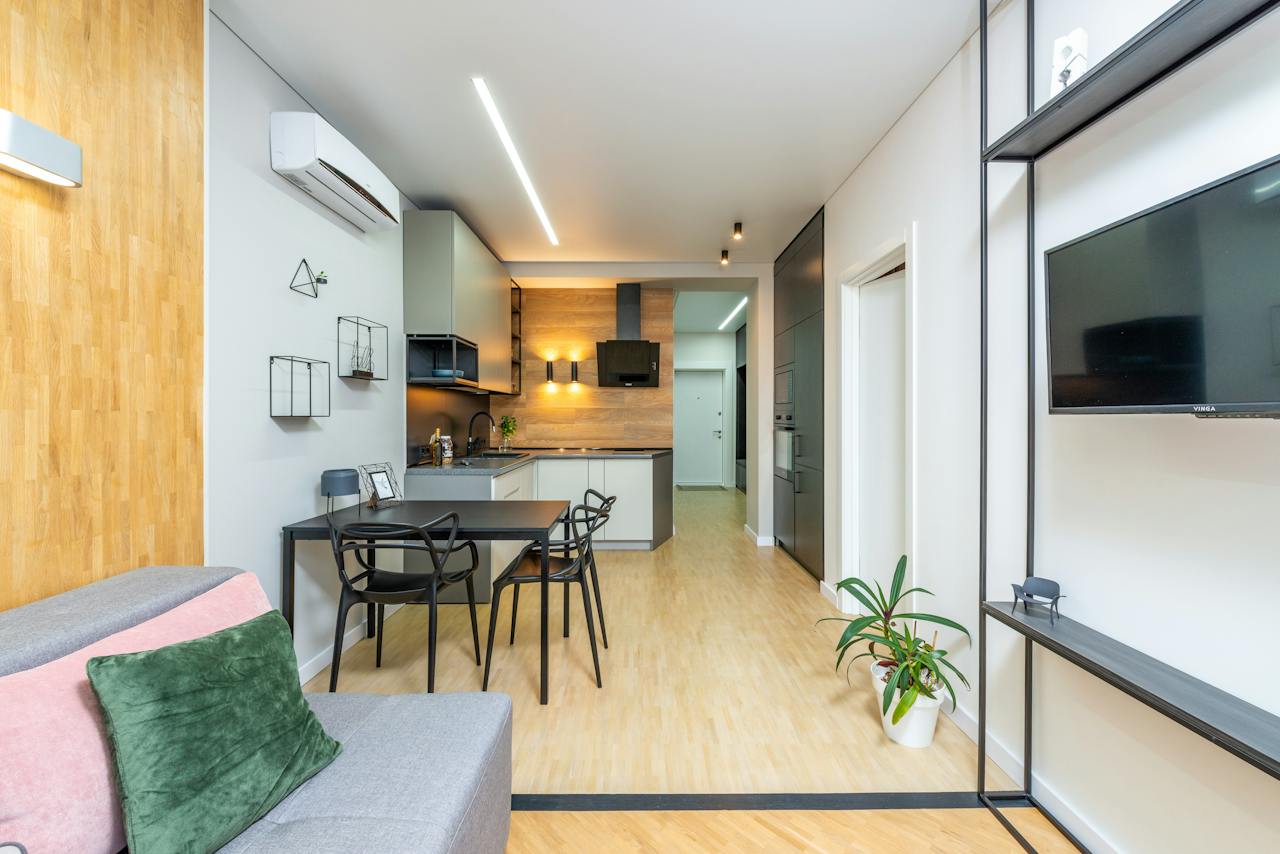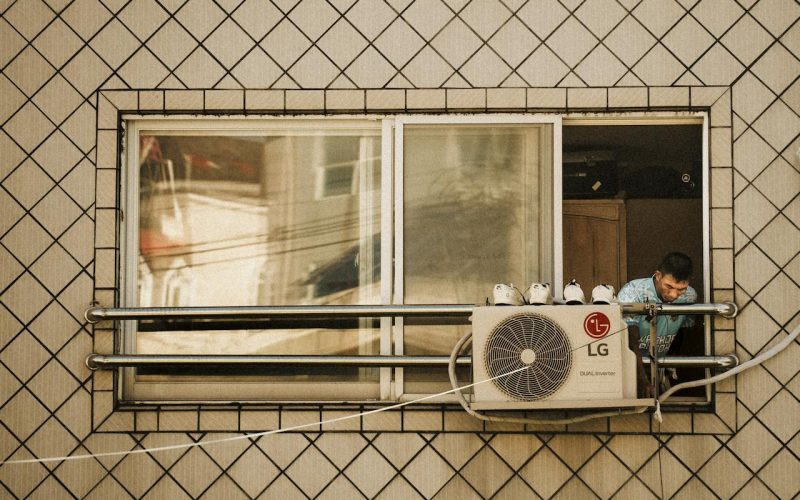If your energy bills have skyrocketed, it’s time to look for ways to improve your AC efficiency. Regular maintenance, sealing air leaks, installing a programmable thermostat, and adding ceiling fans can all save you money on your energy costs this summer.
Dirty vents and ducts restrict airflow, forcing your AC to work harder to cool the house. Clean them regularly to increase airflow and reduce equipment strain.
1. Change the Filter
Keeping your air filter clean is one of the most effective ways to improve AC efficiency. Dirty filters hinder air flow, causing the system to work harder to keep your home cool. This extra strain increases energy consumption and shortens the system’s lifespan. It’s recommended to change the filter every three months, depending on your usage.
Another easy way to increase the AC’s efficiency is to keep the windows and doors closed during peak hours when the sun’s rays are strongest. The sun’s heat can cause the air conditioner to activate and deactivate more frequently, which leads to higher utility bills. If you have windows facing the east or north, curtains and shades can help to limit direct sunlight’s impact on the AC.
The thermostat’s location also affects the system’s efficiency. If it’s placed next to a hot window or in an area where there are heat-producing appliances, the thermostat will overestimate how warm your home is. This causes the AC to run more than it should, resulting in higher utility costs and premature wear and tear on the unit.
Opening the registers while the AC is running will reduce the system’s efficiency and lead to costly repairs down the road. It’s important to leave the air registers closed unless it’s necessary for a room that’s too warm or humid.
Over time, dirt, leaves, twigs, grass clippings, and other debris can build up around the ac condenser. Cleaning the unit twice a year will ensure that it is operating efficiently. A professional technician can also inspect and repair the ductwork to prevent leaks that can increase energy consumption. Insulating the ducts is also an option that can drastically decrease the amount of energy used by your air conditioning.
To ensure optimal performance and longevity of your AC system, it’s crucial to select the right aircon cleaner. Professional services can offer specialized cleaning solutions and expertise, enhancing the overall efficiency of your air conditioning unit.
2. Turn Off Electronics
If you keep electronics plugged in when not in use, they generate heat that causes your air conditioner to work harder. Unplugging these appliances, machines, and gadgets cuts down on their wattage usage and lowers your energy costs. You can also invest in an electricity monitor to see exactly how many watts devices draw, which can be a useful tool to have when you’re trying to save money on your electric bill.
If your home has leaks or gaps, you’re losing valuable cool air to the outdoors. A few minor cracks or gaps are fine, but a moderate amount of air loss makes your AC unit work overtime to keep the house comfortable. Sealing these leaks and gaps can improve your home’s efficiency and comfort.
Some people make the mistake of turning off their air conditioning when they leave for work or the store. This causes the AC to start working harder and longer, which raises energy bills and shortens the unit’s lifespan. Instead of shutting off the system completely, it’s better to set the thermostat higher when leaving the house.
A good temperature setting is 78 degrees Fahrenheit. It’s also important to place your thermostat in a location where it won’t be disturbed, especially from drafts, sunlight, or heat-producing appliances. A well-placed thermostat can help you conserve up to 10 percent of your energy, according to the DOE. A smart thermostat can further increase your AC efficiency with features like occupancy sensors, geofencing, Wi-Fi connectivity, and scheduling capabilities. These features can help you cut down on your energy bills and save on repair costs. They also allow you to control your HVAC from any internet-connected device, making it easy to get the perfect home environment.
3. Increase the Thermostat Settings
Air conditioners are great at cooling your house but can use up a lot of energy while doing it. That’s why it is important to make sure your AC system is running efficiently. Increasing your thermostat settings can be one of the best ways to do this.
The US Department of Energy recommends setting your thermostat to 78 degrees while you are awake and using a ceiling fan in conjunction. By using your ceiling fan and turning up the temperature on the thermostat you can save energy and money. Remember to set your fan to run counterclockwise in summer to create a downdraft and circulate cool air throughout your home.
Another way to improve your AC efficiency is to make sure you do not have any air leaks in your ductwork. This can lead to your system running longer and harder than it needs to. If you have any air leaks it is a good idea to have a professional technician inspect and repair them.
You can also save energy by adjusting your thermostat to a warmer temperature when you are away or sleeping. This will help your system conserve energy and prevent it from overworking itself when you return. A programmable thermostat is the best option for this because it will automatically adjust your thermostat based on your schedule.
These are just a few of the many things you can do to increase your AC efficiency. By doing these simple things you can save energy, reduce your utility bills, and increase your AC system’s lifespan.

4. Install Zoning Controls
One of the best ways to improve your AC efficiency is to invest in a zoned HVAC system. Zoning systems allow you to divide your home or office into different zones for customized comfort levels and energy efficiency. For example, if one person in your family likes it cool at night and another prefers it warmer, you can create two separate zones that have their own settings. This allows you to keep everyone comfortable without wasting energy. It also decreases wear and tear on your system by not forcing it to cool every room in the house at all times.
In addition to boosting air conditioner efficiency, zoning systems can also help reduce indoor noise levels. The fan speed in each zone varies according to the temperature setting, which helps to reduce noise pollution in your home. Finally, a zoning system can improve indoor air quality by reducing the amount of dust and mold that circulates. This can be especially helpful for families with infants or elderly people who may have health problems that require a lower humidity level.
If you are interested in adding a zoning system to your home or business, it is important that you work with an experienced and professional contractor. They can ensure that the system is properly integrated with your current HVAC equipment and that all of the components are working together correctly.
A zoning system will consist of dampers in your ductwork that are controlled by thermostats. When the thermostat senses that a specific zone needs heating or cooling, it signals the dampers to open and close, creating an efficient airflow. This allows you to shut off heating or cooling in areas of the house that are unoccupied at certain times of day, saving on utility costs each month.
5. Schedule Regular Maintenance
Air conditioning systems require regular maintenance to function properly and efficiently. If a home’s equipment is nearing the end of its lifespan, an AC tune-up can help it operate with a lower energy consumption rate than before.
Dirty filters restrict airflow, which forces the unit to work harder to cool a home. Changing your air filter is an inexpensive way to improve your home’s AC efficiency, and it’s a simple task you can perform on your own.
The ductwork in a home is another factor that impacts an air conditioner’s energy efficiency. Leaks and disconnected ducts are common issues that can cause an inefficient system. To ensure optimal performance, clean the outside condenser unit regularly and keep window blinds closed during sunny hours.
A ceiling fan can also improve an air conditioner’s efficiency by circulating cool air throughout a home while using a fraction of the energy that a central AC system does. You can use a smart thermostat to automatically set your ceiling fans to run at certain times and even alter their speed.
It is important to have a professionally inspected and maintained HVAC system to identify any potential problems and address them before they become serious. Getting an air conditioning tune-up helps your equipment operate more efficiently, and it extends the life of your AC system. It’s a good idea to have your equipment serviced before it reaches the 10-year mark for an air conditioner and 20-year mark for a furnace. Keeping your equipment in good shape with routine maintenance will help you avoid expensive repairs. A professional may recommend retrofitting your current equipment with new features or technology to increase its efficiency, depending on its age.

